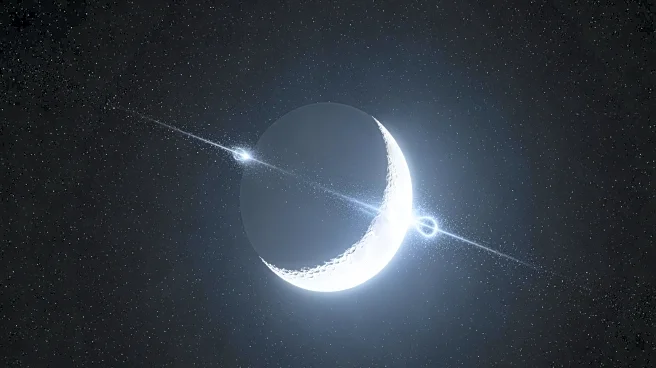What's Happening?
Japanese astronomer Daichi Fujii has captured two distinct cosmic impacts on the Moon, revealing the dynamic nature of its surface. These observations, part of a long-term monitoring program, document
the violent fall of meteoroids onto the Moon, which lacks an atmosphere to protect against such impacts. The impacts produce brief flashes of light, indicating the release of kinetic energy. Fujii's observations coincide with the Taurids meteor shower, suggesting a possible link to Comet Encke. The data enriches the mapping of lunar formations and helps estimate current rates of meteoritic bombardment.
Why It's Important?
Understanding the frequency and distribution of cosmic impacts on the Moon is crucial for future lunar exploration and infrastructure development. As plans for lunar bases and crewed missions progress, this data can inform the design of structures to withstand potential impacts. The observations also contribute to our knowledge of solar system dynamics and the behavior of interplanetary matter. By characterizing these impacts, scientists can better assess risks to human infrastructure and improve safety measures for lunar missions.
What's Next?
The ongoing observation program will continue to document lunar impacts, providing valuable data for future missions. As interest in lunar exploration grows, collaboration between international space agencies may increase to share findings and develop strategies for mitigating impact risks. The methodology used by Fujii demonstrates the accessibility of astronomical research, encouraging amateur astronomers to contribute to scientific discoveries. Future studies may focus on refining impact predictions and exploring the potential origins of meteoroids.
Beyond the Headlines
The study of lunar impacts highlights the importance of international cooperation in space exploration. As countries invest in lunar missions, sharing data and resources can enhance scientific understanding and improve safety protocols. The observations also raise questions about the long-term sustainability of lunar infrastructure and the ethical considerations of space exploration. As humanity expands its presence in space, balancing scientific advancement with environmental stewardship will be crucial.








